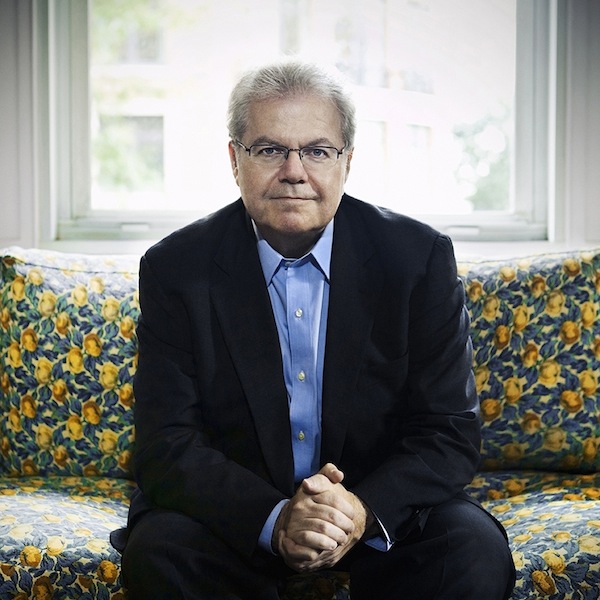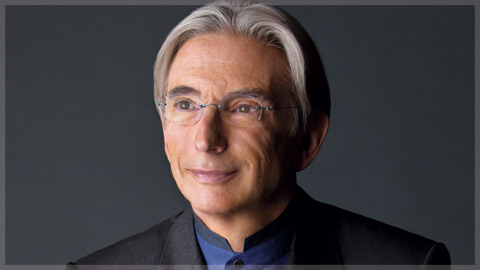MTT and Ax open New World season with Mozart and Schoenberg

Emanuel Ax performed piano concertos by Mozart and Schoenberg with Michael Tilson Thomas and the New World Symphony Saturday night.
Sixty-five years after his death, Arnold Schoenberg can still be a tough sell for concert audiences.
At the season-opening concert of the New World Symphony Saturday in Miami Beach, the conductor Michael Tilson Thomas and pianist Emanuel Ax did their best to prepare the audience for a performance of the composer’s Piano Concerto. Speaking from the New World Center stage, they discussed the work’s themes, demonstrated a few passages and tried to show how the music could be experienced in the same spirit as a concerto by Brahms or Tchaikovsky.
They did not understate the difficulty of grappling with the music of a man whose twelve-tone system of composition attempted to overturn the existing order in music and drove many audience members from the concert hall. “The piece you’re about to hear is definitely one of the most difficult and challenging things there is for all the people in the room,” Tilson Thomas said.
Ax, long an advocate for the concerto, which he recorded with Esa-Pekka Salonen, played in a soft-edged manner—except when the drama of the music required a harder touch. From the lyric opening, his sensual, non-percussive approach to the work fit it into the romantic piano tradition which preceded it, while capturing the concerto’s unique and unearthly mood.
In this performance, Schoenberg’s strange harmonies, often so harsh to the ear, didn’t exactly fade away. But they were accompanied by an emphasis on the textures, the drama, the sweeping sense of theater with which the performers built to the work’s climaxes. There were glints of the late 19th century in the glowing wind harmonies, and in the work’s rhythmic drive. Dissonances came off as eerie and melancholy, rather than grating, except in the brassy climaxes, where they contributed to these passages’ craggy power.
No pre-performance sales job was required for Mozart’s Piano Concerto No. 14. Ax, giving an ironman demonstration of stamina in an evening of two concertos, played in a light, articulated manner, with a sense of the long sweep of Mozart’s melodic passage work. In the second movement, against a glowing accompaniment from the orchestra, he brought an almost Chopinesque sense of wistfulness and dreaminess to the long, yearning melodies. In the last movement, his spiky, angular playing gave contrapuntal passages just enough bite, while remaining within Mozartean proportions, with a fine sense of tension in the dark passage leading up to a restatement of the main theme.
The concert opened with Brahms’ Variations on a Theme by Haydn, which Tilson Thomas described as “one of my most favorite pieces.”
With many of the greatest theme-and-variations works, the composer seems to draw a contrast between the drab or trivial theme on which the work is based and the complex and imaginative variations that follow. The theme here, which musicologists say wasn’t actually composed by Haydn, isn’t drab or trivial, but the orchestra played in a subdued and formal manner that left lots of room for the performance to develop in musical power.
The variations built magnificently, with brilliant individual passages that felt part of a larger whole. Particularly strong were the minor-key variations. Tilson Thomas drew maximum tension from one in which winds and strings engage in a pensive counterpoint, and another, a quiet, rustling passage that created the darkness from which the build-up to the sunlit finale could begin. The finale, however, felt underpowered. It’s a clanging, blaring statement, with the ping of a triangle on top, and it didn’t feel like the weighted, joyous musical payoff that it could be.
The concert ended with Strauss’ Till Eulenspiegel’s Merry Pranks, a virtuoso work that the New World musicians tackled with gusto. Textures were transparent, with horns played in a spirited and immaculate manner. There was a touch of grotesqueness to the swooping melodies, appropriate to this medieval tale of blasphemy, irreverence and death. Playing the E-flat clarinet, which represents the doomed jokester Till Eulenspiegel, Ran Kampel brought out the humor, humanity and final desperation of the character as he faces execution.
The program will be repeated 2 p.m. Sunday at New World Center. nws.edu; 305-673-3331
Posted in Performances
Leave a Comment
Sun Oct 16, 2016
at 12:25 pm
No Comments

